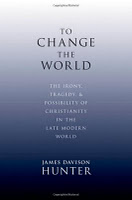 The most important book I read this fall is James Davison Hunter’s To Change the World: The Irony, Tragedy, and Possibility of Christianity in the Late Modern World.
The most important book I read this fall is James Davison Hunter’s To Change the World: The Irony, Tragedy, and Possibility of Christianity in the Late Modern World.
I expected a “why Christians need to get into the halls of power” book. But this book is far more interesting, a critique of that very vision.
Hunter, a sociologist and professor of Religion, Culture, and Social Theory at the University of Virginia, takes on both the Christian left and the Christian right (both Jim Wallis of Sojourners and James Dobson of Focus on the Family are fingered). Hunter argues that a pursuit of and desire for power and social control dominates American Christianity’s approach to cultural change. This pursuit is, he believes, morally bankrupt and theologically suspect (my extended review explores Hunter’s argument about Christian captivity to “politicization”).
Hunter’s antidote to this captivity is what he calls faithful presence within. This alternative counters the defensive against paradigm of the Christian right, the relevance to paradigm of the Christian left, and the purity from paradigm of those Hunter terms “Neo-Anabaptists.” The challenge of Christian faithfulness is two-fold: to detach the church from politics and the public from the political. The hope that Hunter sees is in a public church, with a faithful presence not apart from society, but within (contrary to “purity from”), and with an Christian/church identity which is detached from an American identity (contrary to “defensive against” and “relevance to”). The problem is that Christianity has assimilated too much into the state and the market and lost the critical differences required to be a prophetic presence.
Hunter adopts a startling theological category for faithful presence within: exile. Jeremiah’s call to the Jewish people is not to flee Babylon but to “build houses and live in them; plant gardens and eat their produce” (Jeremiah 29:4-7). Faithful presence is to become a “community of Christians [who] are now, more than ever – spiritually speaking – exiles in a land of exile. Christians, as with the Israelites in Jeremiah’s account, must come to terms with this exile” (280).
Choosing Jews in Babylon as the analogy for creating a new kind of Christianity in America says a great deal about how un-Christian Hunter thinks the church has become. Namely, a weak culture, precisely by selling its soul to politics and mixing its identity with the nation.
A quote from the end of the book:
“[Changing the world is] based on the dubious assumption that the world, and thus history, can be controlled and managed … By this logic our actions are justified only by the outcomes they promise to bring about … Christianity is not, first and foremost, about establishing righteousness or creating good values or securing justice or making peace in the world. Don’t get me wrong: these are goods we should care about and pursue with great passion. But for Christians, these are all secondary to the primary good of God himself and the primary task of worshiping him and honoring him in all they do” (285-6)
I’m interested if others have read this book, and what you think.
See my extended review of Hunter’s book including comments on strengths and weaknesses …

Leave a reply to drgabrielse Cancel reply